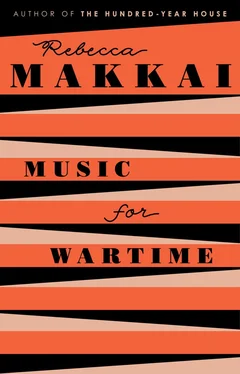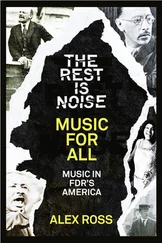But if this were your family legacy — this ridiculous assertion of the might and violence of ink, this blatant and beautiful falsehood — could you change it? Would you dare?
H e thought how strange that a political prisoner, marched through town in a line, chained to the man behind and chained to the man ahead, should take comfort in the fact that all this had happened before. He thought of other chains of men on other islands of the earth, and he thought how since there have been men, there have been prisoners. He thought of mankind as a line of miserable monkeys chained at the wrist, dragging each other back into the ground.

In the early morning of December 1 the sun was finally warming them all, enough that they could walk faster. With his left hand, he adjusted the loop of steel that cuffed his right hand to the line of doomed men. He was starved, his wrist was thin, his body was cold: The cuff slipped off. In one breath he looked back to the man behind him and forward to the man limping ahead, and knew that neither saw his naked, red wrist; each saw only his own mother weeping in a kitchen, his own love on a bed in white sheets and sunlight.
He walked in step to the end of the block.
Before the war this man had been a chef, and his one crime was feeding the people who sat at his tables in clouds of smoke and talked politics. He served them the wine that fueled their underground newspaper, their aborted revolution. And after the night his restaurant disappeared in fire, he had run and hidden and gone without food — he who had roasted ducks until the meat jumped from the bone, he who had evaporated three bottles of wine into one pot of cream soup, he who had peeled the skin from small pumpkins with a twist of his hand.
And here was his hand, twisted free of the chain, and here he was running and crawling, until he was through a doorway. It was a building of empty classrooms — part of the university he never attended. He watched out the bottom corner of a second-story window as the young soldiers stopped the line, counted ninety-nine men, shouted to each other, shouted at the prisoners in the panicked voices of children who barely filled the shoulders of their uniforms. One soldier, a bigger one, a louder one, stopped a man walking by, a man in a suit, with a briefcase, a beard. Some sort of professor. The soldiers stripped him of his coat, his shirt, his leather case, cuffed him to the chain. They marched again. And as soon as they had passed — no, not that soon; many minutes later, when he had the stomach — the chef ran down to the street and collected the man’s briefcase, coat, and shirt.

In the alley, the chef crouched and buttoned the professor’s shirt over his own ribs. When he opened the briefcase, papers flew out, a thousand doves flailing against the walls of the alley. The chef ran after them, stopped them with his feet and arms, herded them back into the case — pages of numbers, of arrows and notes and hand-drawn star maps. Here were business cards: a professor of physics. Envelopes showed his name and address — information that might have been useful in some other lifetime, one in which the chef could ring the bell of this man’s house and explain to his wife about empty chains, empty wrists, empty classrooms. And here was a note from that wife about the sandwich she had packed him. There was no sandwich left. Here were graded papers, a fall syllabus, the typed draft of an exam. The extra question at the end, a strange one: “Using modern astronomical data, construct, to the best of your ability, a proof that the sun actually revolves around the earth.”

The chef knew nothing of physics. He understood chemistry only insofar as it related to the baking times of bread at various elevations. His knowledge of biology was limited to the deboning of chickens and the behavior of yeast. What did he know of moving bodies and gravity? He knew this: He had moved from his line of men, creating a vacuum — one that had sucked the professor in.
The chef sat on his bed in the widow K——’s basement and felt, in the cool leather of the briefcase, a second vacuum: Here was a vacated life. Here were salary receipts, travel records, train tickets, a small address book. And these belonged to a man whose name was not blackened like his own, a man who was not hunted. If he wanted to live through the next year, the chef would have to learn this life and fill it — and oddly, this felt not like a robbery but like an apology, a way to put the world back in balance. The professor would not die, because he himself would become the professor, and he would live.
Surely he could not teach at the university; surely he could not slip into the man’s bed unnoticed. But what was in this leather case, it seemed, had been left for him to use. These addresses of friends, this card of identification, this riddle about the inversion of the universe.

Five cities east, he gave his name as the professor’s, and grew out his beard so it would match the photograph on the card he now carried in his pocket. The two men no longer looked entirely dissimilar. To the first name in the address book, the chef had addressed a typed letter: “Am in trouble and have fled the city. Tell my dear wife I am unharmed, but for her safety do not tell her where I am. If you are able to help a poor old man, send money to the following postbox…. I hope to remain your friend, Professor T——.”
He’d had to write this about the wife — how could he ask these men for money if she held a funeral? And what of it, if she kept her happiness another few months, another year?
The next twenty-six letters were similar in nature, and money arrived now in brown envelopes and white ones. The bills came wrapped in notes (Was his life in danger? Did he have his health?), and with the money he paid another widow for another basement, and he bought weak cigarettes. He sat on café chairs and drew diagrams of the universe, showed stars and planets looping each other in light. He felt that if he used the other papers in the briefcase, he must also make use of the question. Or perhaps he felt that if he could answer it, he could put the universe back together. And, too, it was something to fill his empty days.
He wrote in his small notebook: “The light of my cigarette is a fire like the sun. From where I sit, all the universe is equidistant from my cigarette. Ergo, my cigarette is the center of the universe. My cigarette is on earth. Ergo, the earth is the center of the universe. If all heavenly bodies move, they must therefore move in relation to the earth, and in relation to my cigarette.”
His hand ached. These words were the most he had written since school, which had ended for him at age sixteen. He had been a smart boy, even talented in languages and mathematics, but his mother had needed him to make a living. He was not blessed, like the professor, with years of scholarship and quiet offices and leather books. He was blessed instead with chicken stocks and herbs and sherry. Thirty years had passed since his last day of school, and his hand was accustomed now to wooden spoon, mandoline, paring knife, rolling pin.
Today his hands smelled of ink, when for thirty years they had smelled of leeks. They were the hands of the professor; ergo, he was the professor.

Читать дальше













